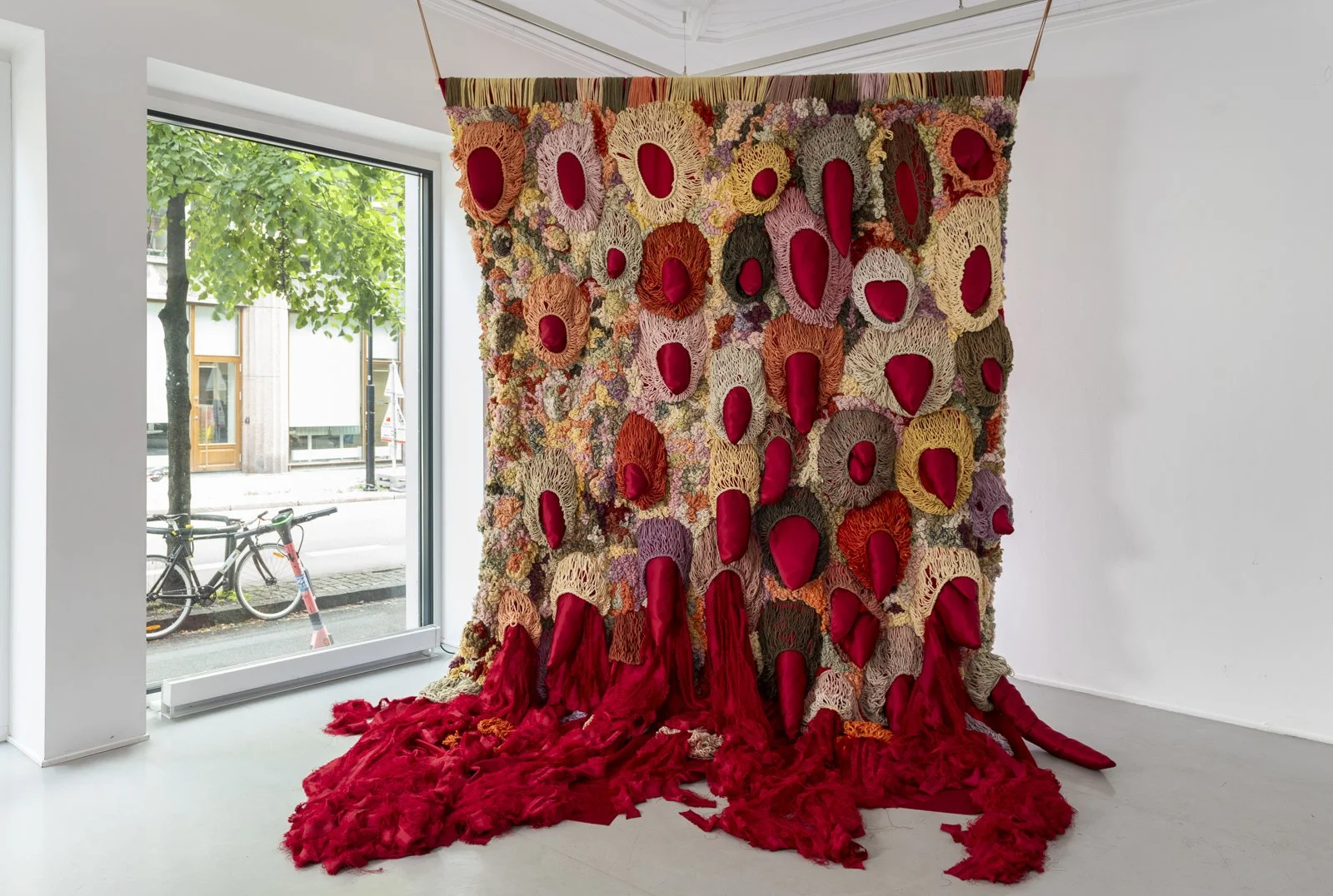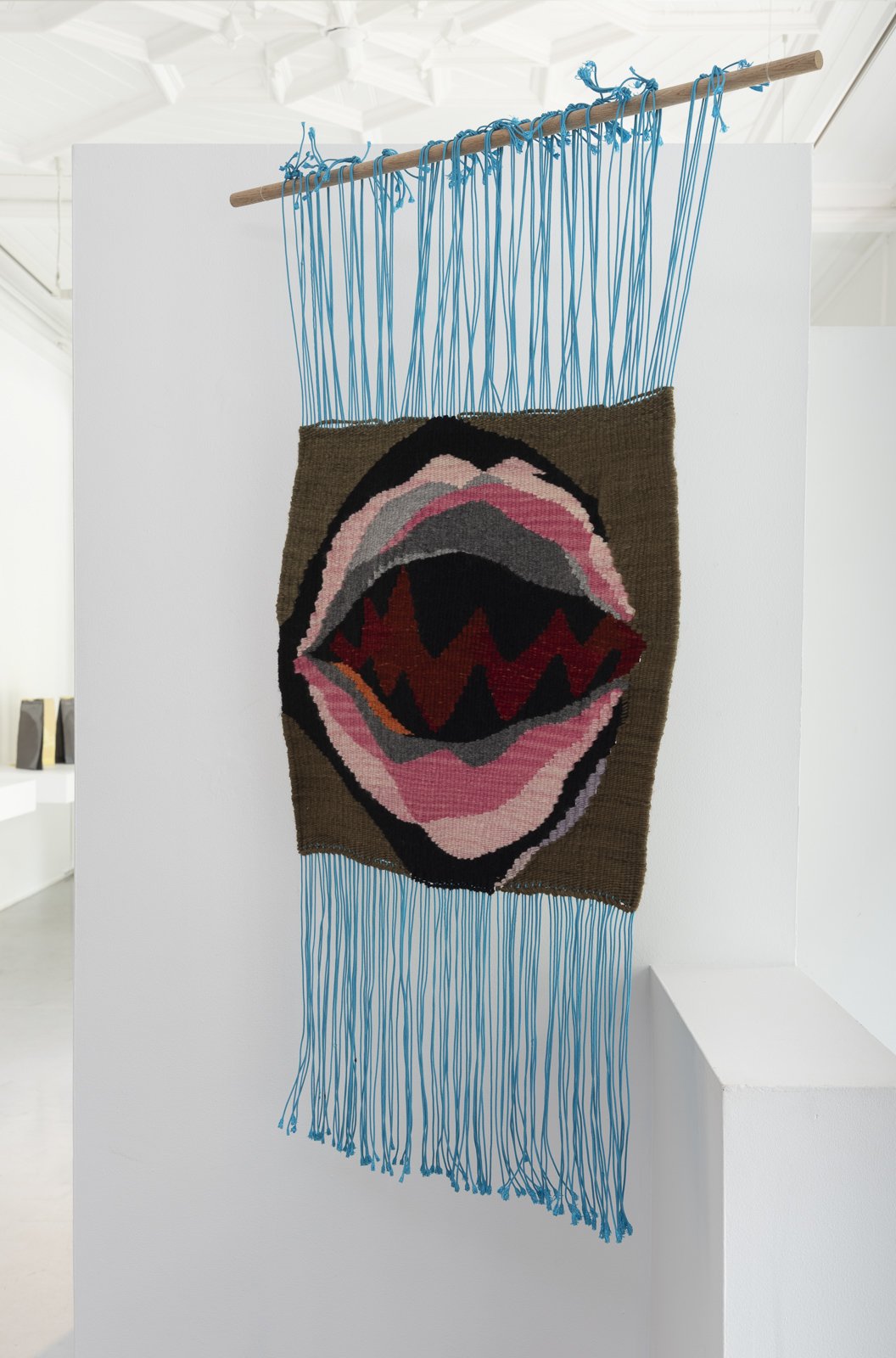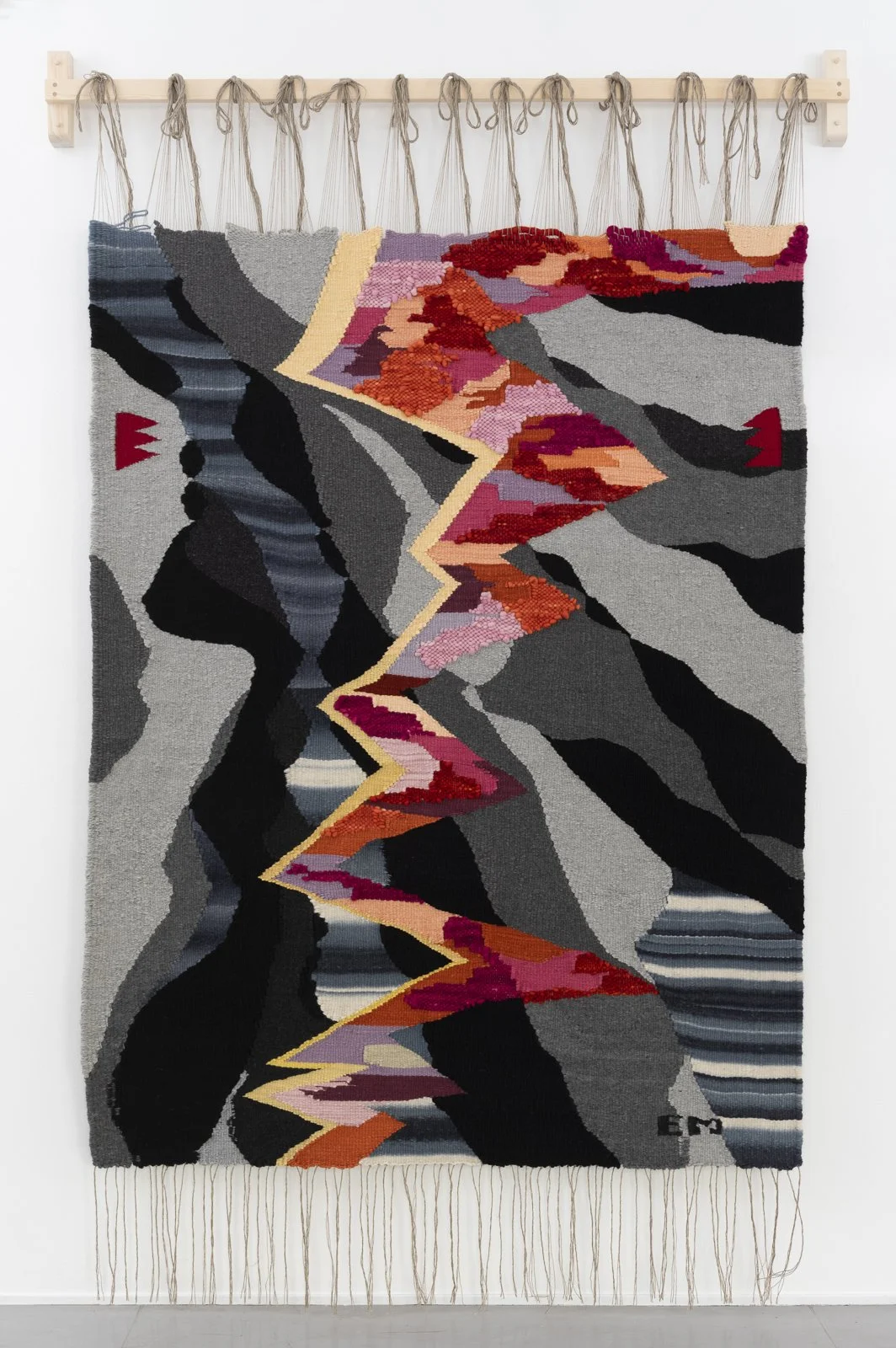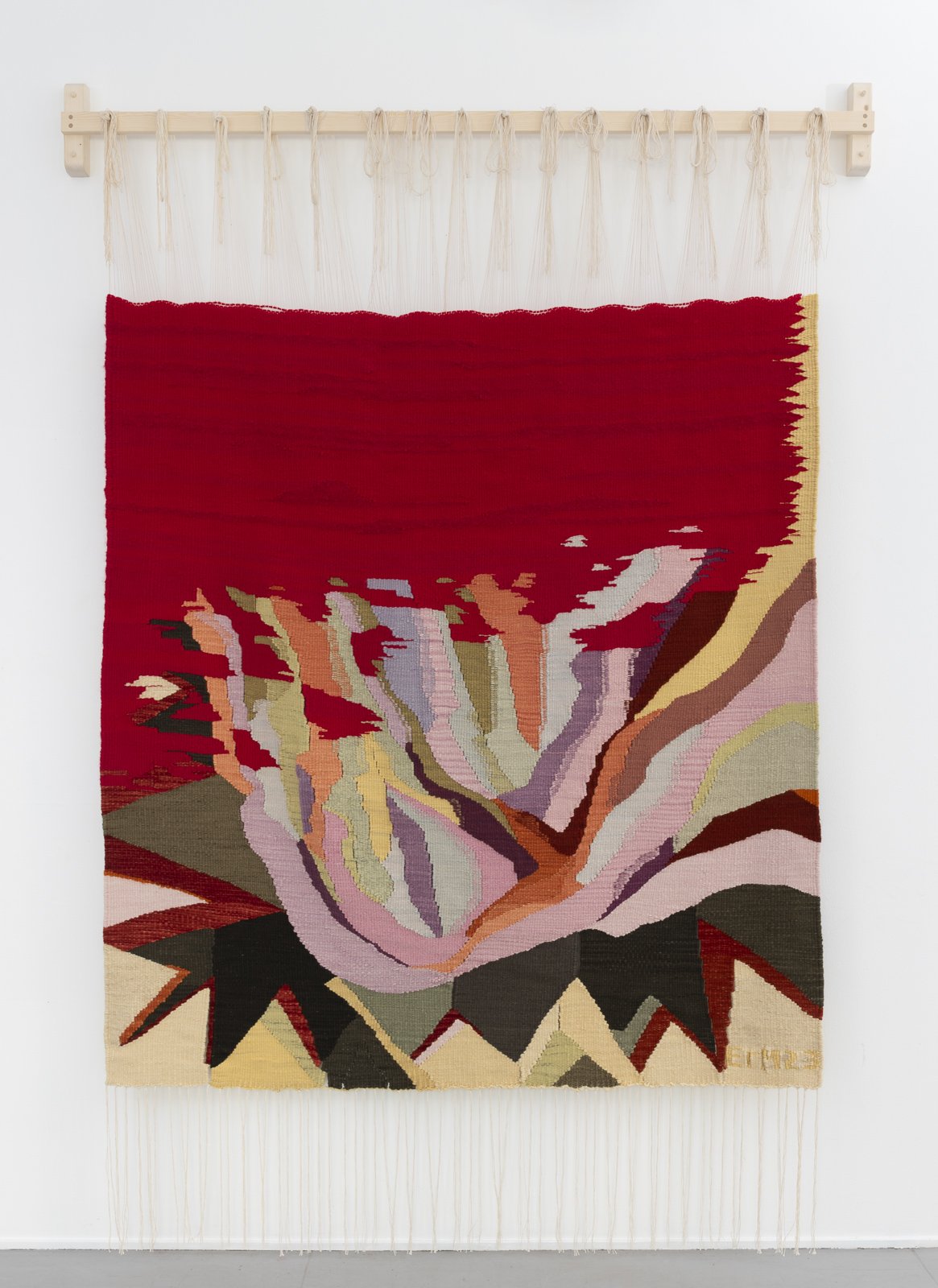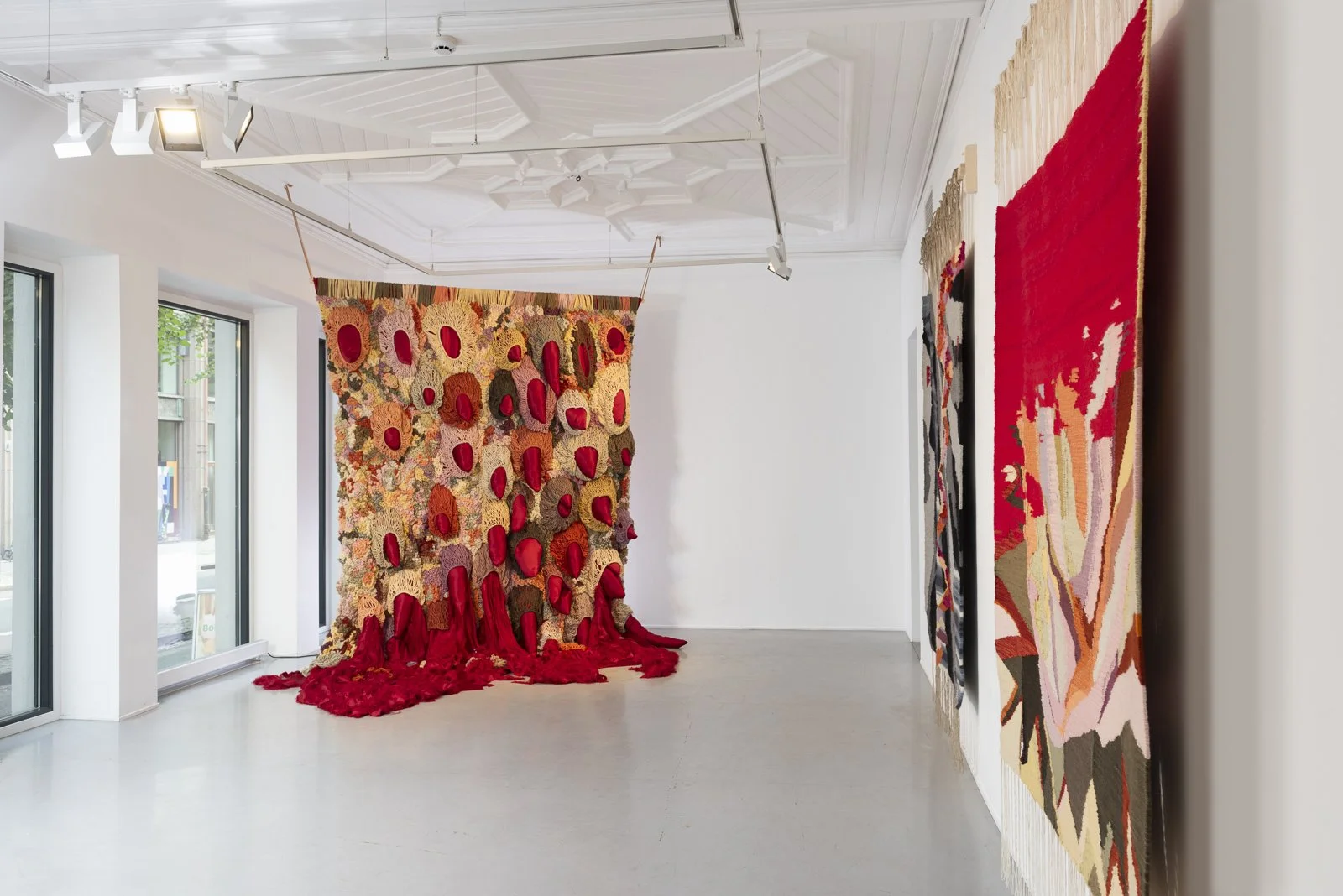Elin Reboli Melberg
Klag ikke under Stjernene over Mangel paa lyse Punkter i dit Liv
(Do not complain under the stars about a lack of points of light in your life)
10 August - 24 September 2023
Elin Reboli Melberg often chooses time-consuming and detailed projects. One example is from 2011, when she built a room completely covered with mirror mosaics and glossy pictures. She has also often taken recourse in personal and challenging experiences, incorporating them into the creative process and allowing them to influence her materials, techniques and themes. When her father died in 2013, she embroidered his final text message to her in the work Elove (2014). Grieving took the form of a demanding and tactile work process that involved larger, softer and more nature-based materials than she had ever used before. During the pandemic the size of her textile works increased. Knitted works stretching from the ceiling to the floor, then flowing out across the floor, triggered a desire to be enveloped and protected. Many years ago, Melberg inherited one of her grandmother’s looms. She didn’t do anything with it for a long time, but with inspiration from Synnøve Anker Aurdal’s large exhibition at Astrup Fearnley Museum in 2022, the time finally came. While respecting traditions, Melberg wanted to retain the possibility to explore, experiment and make room for the imperfect, vulnerable and tactile aspects that also characterise her earlier works. She dyed yarn outdoors, using, among other things, plants from her own garden such as pine, rhubarb, tansy and lady’s mantle. In this exhibition one can find tension between the plant-dyed wool yarn and the brightly-coloured synthetic yarn. The exhibition title is an excerpt from the poem Mig Selv (Myself), written in 1841 by Henrik Wergeland.
Several artists, for instance Frida Hansen and Elisabeth Harr, have been significant for Melberg – initially as regards techniques, motifs and themes, and eventually also as ‘sisters in arms’. The works in the exhibition are once again marked by transformative experiences, this time relating to a whistleblowing case. In the winter of 2022–23, Melberg wrote a letter to the newspaper Stavanger Aftenblad in which she questioned an undemocratic political process that turned out to be in conflict with the rules of the EEA Agreement. Her published letter triggered a witch hunt on social media (SoMe) platforms: well-known control techniques were used to cast suspicion on Melberg and to degrade and ridicule her. After a new and democratic political process was implemented, it resulted in a different outcome. On one hand, this confirmed to Melberg that her reasons for reacting to the initial political process were valid, on the other hand, the attacks on SoMe increased.
When the harassment was at its most intense, Melberg gained support from the fighting spirit and social involvement of 20th-century Norwegian textile artists. She is deeply grateful to these artists, describing them as allowing her to ‘sit on their shoulders’, as it were, when they wove their political messages. In time-consuming and repetitive processes, there is also the opportunity for calmness, processing and healing. Memories become attached to the materials – for better and worse. Melberg, in this exhibition, takes ownership of the names she was called in the closed SoMe groups by using them as titles. She wants to shed light on how democracy becomes vulnerable when the possibility to point out injustice is threatened. Both locally and globally, the consequences for those who raise their voice can be so excruciating that they choose never to do it again. Observers from the sidelines are also dissuaded from speaking up. We see this when young, skilful politicians retreat from politics due to bullying and threats, and when whistleblowers in workplaces switch jobs or take sick leave. Melberg has demonstrated her political commitment for many years, both through her art and her participation in various committees and on boards, yet she has probably never been as personal as here. At the same time, this exhibition is about mechanisms that pervade power structures worldwide. Countries with democratic forms of government are in decline, and the consequences largely mark the news. The works on show can also have a strengthening and unifying function for others in similar situations. Melberg is in no doubt that she would whistleblow again, but the cost is high and support is vital.
The exhibition is supported by Arts Council Norway, Rogaland County, Stavanger Municipality and the Relief Fund for Visual Artists.
Mona Mørk
Art Historian
Elin Reboli Melberg (b. 1976) lives and works in Stavanger. She earned a master’s degree in fine art from the Royal College of Art, London (2002). Her recent exhibitions have been held at Haugalandmuseet, Haugesund (2021–22); Hå Gamle Prestegard, Jæren (2021); Stavanger Art Museum (2021); North Norwegian Art Museum, Tromsø (2020-21); Abingdon Studios, Blackpool, UK (2019); Interface Gallery, Oakland, USA (2019); Kunsthall Stavanger (2018) and Kunstmuseet KUBE, Ålesund (2018). She has also participated in international art fairs in Copenhagen, San Francisco, Hong Kong and Miami. Melberg’s works have been purchased by, among others, Haugalandmuseet (2022), Stavanger Art Museum (2021, ’20, ’19 & ’14), Stavanger University Hospital (BUPA) (2016), the City of Oslo Art Collection (2015), Stavanger Municipality (2015 & ‘09) and Equinor (2011, ‘05 & ‘03). In recent years she has also created textile sculptures/scenography for theatre productions such as Elle Sofe Sara’s ‘Vástádus eana – The Answer Is Land’ (2021) and Dybwikdans´s ‘MÅNEmåne’ (MOONmoon) (2019) and ‘Bakom Stjernene’ (Behind the Stars) (2022). With Margrethe Aanestad, Melberg co-directed the artist-run exhibition space Prosjektrom Normanns in Stavanger (2013–20). She is also a co-founder of the artist collectives Elefant (2013) and Open Studios Stavanger (2022). In 2022 Melberg received a 10-year work grant from Arts Council Norway.

